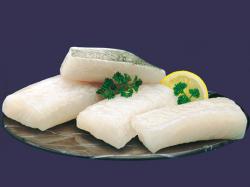Study Suggests Consumption Of White Fish Improves Blood Pressure, Lowers Cholesterol & Reduces Weight
June 5, 2012 | 2 min to read

CORAL GABLES, Fla. — While the health benefits of omega-3 fatty acids derived from fish has long been known, the first clinical study carried out on the health benefits derived from the hake fish specifically, was recently completed in Spain and is even more comprehensive in its conclusions on how fish — particularly white fish – directly impacts our health.
Thirteen Spanish public hospitals participated in the study, which was coordinated by the Nutrition & Obesity Unit of Hospital Ramon y Cajal in Madrid and sponsored by Pescanova, S.A. and the Namibian Ministry of Fishing and Marine Resources. The study consisted of feeding frozen Namibian hake to Spanish patients with high cardiovascular risks who were suffering from metabolic syndrome.
Two hundred and fifty-seven patients with metabolic syndrome were subject to a diet lasting 16 weeks, split into two stages: 8 weeks of exclusion from any seafood, followed by 8 weeks of daily consumption of 100g of Namibian frozen hake, or vice-versa. Patients' weight, size, waist perimeter, body mass index and blood pressure were measured during the extent of the study and blood analysis was carried out during each stage to ascertain the lipid profile, glycemic and plasma omega-3 DHA levels.
The results? The study concluded that the frequent consumption of hake improves blood pressure, lowers cholesterol and reduces weight. These research results show that the frequent consumption of hake improves arterial diastolic(blood) pressure, reduces weight and decreases LDL-Cholesterol levels. It was concluded from the study that hake is a natural, adequate and sufficient source of omega-3 fatty acids.
"This is a ground breaking study," says Jose Abbad, President, Pescanova USA. "The long-term health benefits of hake are clear and astounding and our hope is that the medical community and consumers in the U.S. will seriously contemplate how to incorporate these momentous results in future health and wellbeing decisions."
To date, no scientific study had demonstrated the health benefits of hake, and therefore of white fish consumption, as derived from its omega-3 fatty acid content, a fact that has been well proven in blue fish. This is the first clinical study carried out with hake in multiple hospital centers with medically scientific research and execution.
Pescanova USA imports hake from Namibia, located in the southern half of Africa. Fishing represents nearly 10% of Namibia's GDP. Hake is the most relevant species for this country's fishing industry and provides employment to more than 10,000 people. There are currently 50 companies in Namibia's hake sector, which includes 18 processing plants and a trawling and long lining fishing fleet of about 80 vessels that are dedicated to the catching of hake. The current annual TAC is 170,000 tons. Namibia exports hake to several European countries, mainly to Spain because of its traditional consumption of the white fish. Hake is also exported to other countries around the world, including Australia, the USA and South Africa.
About Pescanova USA
Pescanova USA, a leader in the importing and distribution of seafood products into North America, is committed to providing the highest quality wild caught and aquaculture seafood products while ensuring social and environmental responsibility, food safety and traceability.
Pescanova USA, named one of the top 50 seafood commerce companies in the Americas by Interfish.com, is committed to advancing environmentally and socially responsible seafood practices.
Source: Pescanova USA
